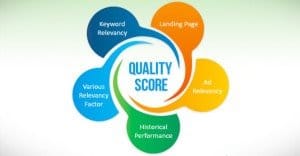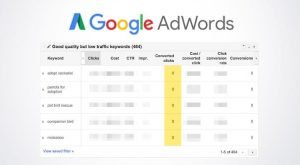10 of The Most Common Google AdWords Mistakes

AdWords is a complex system, and it can be very difficult for new users to grasp in its entirety. Heck, some pro-tier marketers don’t even use parts of the system. Even so, there’s plenty of valid documentation available, and posts like this one. Avoid these common mistakes and you’ll be well on your way to at least moderate AdWords success. I’d say you’ll be great, but I don’t want to get your hopes up; greatness takes more than just avoiding the worst mistakes.
1. Failing to Properly Group Keywords
When you come up with a selection of keywords for your ads, you’re doing so because you want ads to show up for each of those keywords. When you run them all lumped into one ad group, however, your ads show up for all those keywords but they all have the same ad copy. Now, ideally, you’ll want your copy to match the keywords people are searching, so you want unique copy for each set of closely related keywords. That’s where ad grouping comes in. Ideally, you don’t want more than 20 keywords in an ad group; any more than that and they’re probably so disparate that they start to not match the copy. Unless, of course, you’re using extremely generic copy, which isn’t worthwhile.
2. Using Generic Copy
AdWords only gives you 70 characters – not words – to make your sale. With PPC ads, you only have a split second to capture user attention and get them to click your link. This can be extremely difficult, particularly if you’re not front-loading your unique sales proposition. What makes your company different from all the others in your niche? What makes users want to buy from you rather than any of your competitors? What makes your offer better than any other? Tell your users in your ad copy. For a keyword like “shoes” you don’t need to tell people you sell shoes; they already know, they’re searching for shoes. You need to tell them why your shoes are the best shoes to buy.
3. Ignoring Keyword Match Types
AdWords allows three different keyword match types; broad, phrase, and exact. You need to use them correctly.
- Broad match displays your ad for any query that includes the words in your keyword. The keyword phrase “Blue Solar Widgets” would display ads for queries like “Blue solar panel widgets” and “I want to find solar widgets in blue.”
- Phrase match is a little more specific. Again with the Blue Solar Widgets example, your ads would show up for “Where can I buy blue solar widgets” but not “Where can I buy solar widgets that are blue.” You need the full phrase in order, but other surrounding keywords don’t matter.
- Exact match is even more specific. Blue Solar Widgets is the only phrase that shows your ad. Even if someone puts in “buy blue solar widgets” they won’t see your ad.
Learn, love, and implement the right matching for your various keyword phrases. Once you’re a little more advanced, you can even get into modifiers.
4. Forgetting Negative Keywords
A negative keyword is not just a “bad” word; it’s a word that would turn your keyword phrase into something you don’t want to show your ad for. For example, you don’t want to show your Blue Solar Widgets ad on a query for “Why Blue Solar Widgets Suck.” You would want to add “suck” to your negative keywords list, just to make sure your ad doesn’t show up for such searches. You can see a general list of negative keywords here, and add to it as you see fit.
5. Not Setting an End Date
PPC ad campaigns are like radioactive material; they have a half-life. If you don’t know, the half-life of a radioactive material is the amount of time it takes for half of a given amount of a substance to emit radiation and fall to a lower energy state. For ad campaigns, it’s the amount of time for your ads to decrease in efficiency by half. This usually happens due to over-exposure; people keep seeing the same old ads and tune them out. Keep your ads fresh by setting end dates and changing them up when those dates are reached.
6. Going With Your Gut
Google is known for their Analytics software as one of the most widespread and robust pieces of analytical software available. AdWords has a lot of analytics attached to it as well, so you have an absolute wealth of data to use to inform your decisions.
If you ever find yourself making a decision based on gut instinct rather than concrete data, step back and put your mouse down. Look at the data and use it to make a decision. If you have two ads, and you like one more, but the other one has better numbers, go with the other one. Never trust your gut over the data unless you’re completely willing to lose money.
7. Not Targeting Yourself
In the Google search results, AdWords sponsored ads appear at the top, above the organic results. When someone searches for your brand name, you should appear in the number one spot… of the organic results. Someone else could target your brand name with ads and try to undercut you on your own branded search results. You need to be running ads for your own brand all the time, just to make sure this doesn’t happen.
8. Not Testing
Split testing ads is incredibly simple. Just take one ad, copy it, paste it, change one thing, and run them both. The one that works better, adopt as a change to both versions, change another variable, and run them both again. Keep doing this, constantly. Your ads should be a constant evolution. You can test everything from your headline, copy, description and any images, all the way to your landing page and even your URL.
9. Accidentally Misleading Ads
This one is common despite it being an easy mistake to fix. It happens when your ad leads users to a landing page that doesn’t match their intent. Don’t claim you have a 25% discount, only for users to see nothing of the sort when they reach your site.
This is typically caused in two ways; not having an end date, and split testing. When you don’t have an end date, it’s easy to keep running an ad with promotional copy that includes a deal that ended. When you’re testing, it’s easy for your copy to deviate away from the original intent, ending up significantly different from the landing page. Make sure to do an occasional review to maintain coherence.
10. Not Having a Budget
It’s easy to see success stories about advertising on AdWords and feel like you too can pull in that kind of success. The thing is, a lot of companies have a lot of money to throw around. If you’re going into it with a monthly budget of $500, you’re probably going to need to tone down your expectations. It costs a lot to run a long-term ad campaign with varied and robust results.
 ContentPowered.com
ContentPowered.com





